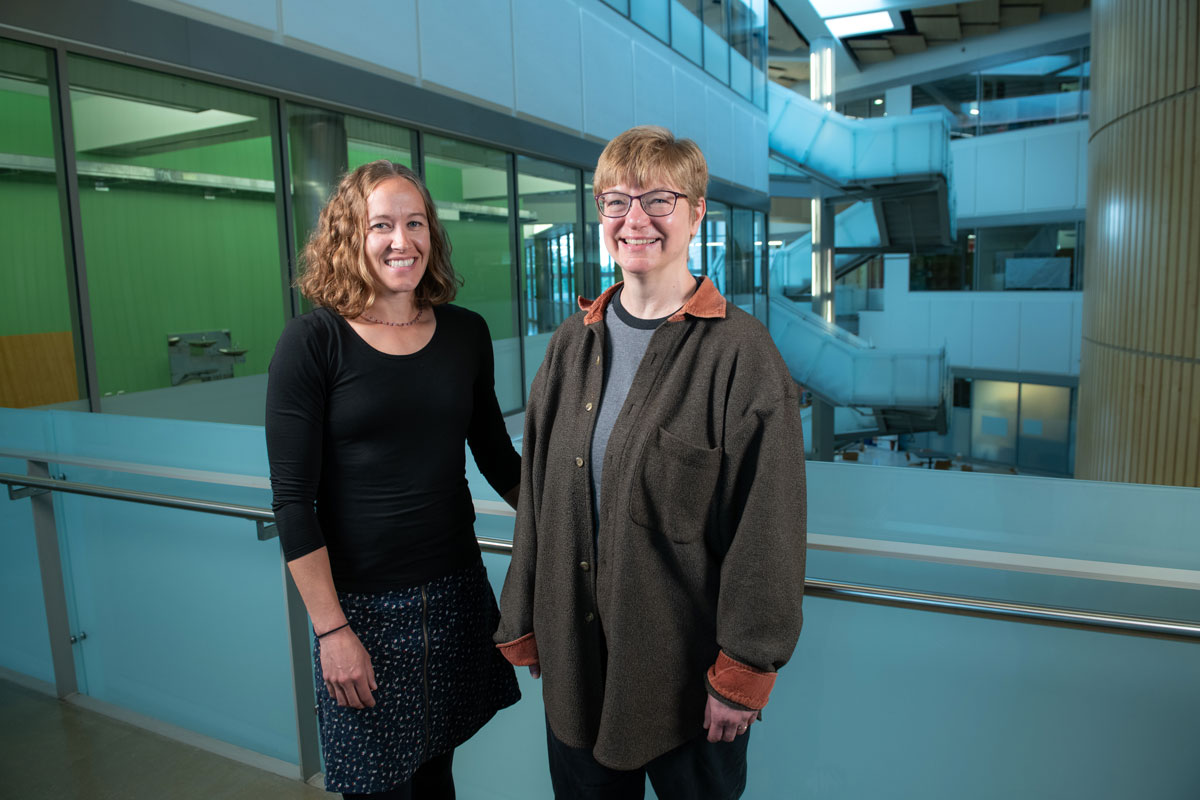Growing Alaska's research community
by Michelle Saport |

Co-principal investigators Tracey Burke, Ph.D., professor in the School of Social Work, and Holly Martinson, Ph.D., associate professor in the WWAMI School of Medical Education, hope the program empowers more Alaskans to pursue an advanced biomedical, research-focused degree and contribute to the research community.
"I hope this grows research exponentially, starting with students supporting faculty research projects, but then also them gaining all the tools necessary to potentially conduct research on their own," said Martinson.
Meet the first cohort
The program welcomed its initial cohort over the summer: chemistry major Hanna Whang, chemistry major Alyssa Samson, natural sciences major Bryce Inman, and natural sciences major Steven Cherry. Only a few months into the two-year program, all four students credited their experience so far with making research accessible and providing opportunities they never anticipated when applying for UAA.
"I think this program gives a really good structure to students who didn't know or have experience with research beforehand," said Whang, an Alaska Middle College graduate who is working with Professor Jason Burkhead to identify responsive biomarkers to help treat advanced viral diseases. "I feel a lot more confident in myself and more excited to do research."
Samson, also an Alaska Middle College graduate, is working with Professor Khrys Duddleston regarding gut microbe research on ground squirrels as it relates to muscle mass disorders. "People think that going into research is really intimidating and scary — and it kind of was initially, but after the first or second week when you get with everyone, it becomes really simple," said Samson, calling research one of her favorite activities.
Inman, originally from Kodiak, is spearheading research in Dr. Eric Bortz's lab to streamline the detection and treatment of drug-resistant Mycobacterium tuberculosis. Their innovative approach involves the identification of drug-resistance genes in patient stool and sputum samples. They plan to deploy this groundbreaking research in Ukraine, a region grappling with a high prevalence of drug-resistant-associated mortality, which holds the promise of significantly accelerating and improving the effectiveness of tuberculosis treatment protocols. "I've become much more interested in this research topic and communicating that to people who otherwise wouldn't have known about this or been interested in science before," said Inman.
Cherry, meanwhile, is working with Martinson and Associate Professor Dr. Max Kullberg to research the potential of antigen-delivery systems for treating cancer. This promising avenue holds the potential to bolster the efficacy of cancer immunotherapy responses, representing a crucial stride toward improved cancer treatment paradigms.
"We have motivated, smart students in these four labs now who might not have been there otherwise," said Burke.
In addition to gaining valuable research experience, students benefit from extensive mentorship from faculty and graduate students and even serve as mentors during the program's second year. Two mandatory courses taken during the first year in the program, URS 388A and 388B — Developing a Scholarly Identity I & II, help orient students and connect them with fellow undergraduates interested in research.
To help recruit more nontraditional students and underrepresented students into research, the program also includes a monthly stipend and tuition assistance for participants — one of the most generous financial packages currently offered by any of UAA's research-oriented programs for undergraduates, according to Burke.

'An awesome place to be'
For Martinson, who earned her bachelor's degree in chemistry from UAA in 2008, the program is a continuation of her efforts to give back to the place where she first started doing research.
"It's an awesome, awesome place to be," said Martinson, who cites her undergraduate research experience as key for preparing her for the Ph.D. in Cancer Biology program at the University of Colorado. "I wish more students from Alaska knew what opportunities are unique to here that they may not get anywhere else."
Martinson hopes providing experience and opportunity to more students "lights a fire" that fuels Alaska's research community.
"My goal for all my students is to potentially come back and practice as well as do research, which can benefit all of Alaska," said Martinson. She notes that several of the first students she mentored as a WWAMI faculty member are currently enrolled in Ph.D. programs with the intent to come back to Alaska for cancer research, while others are working in-state with other doctors to conduct quality control research to improve healthcare outcomes for Alaskans.
'This doesn't happen anywhere else'
"We want everybody to feel like they can be a researcher," said Burke. "For the people who don't want to pursue research, we want it to be because they decided they weren't interested, not because they didn’t feel welcome. We want to get rid of any sense that, 'It's for other people, not for me.' And replace it with: 'If I want to be one of those people, I can.'"
Martinson notes the Biomed U-RISE program is one of many ways for undergraduate students to gain research experience at UAA. From research-focused classes to independent projects and fellowships, the abundance of opportunities for students across all programs and class standings is unique.
"To be able to come to UAA and have all these opportunities available at an undergraduate level is novel," said Martinson. "This doesn't happen anywhere else."
Get involved with research
Applications for the next Biomed U-RISE cohort will be open from Dec. 15-Feb. 15 on the program website. To learn about more research opportunities for undergrads, reach out to the Honors College.
This story originally appeared in the UAA Green and Gold News.
Student Stories
Research
Events and Highlights
Alumni
In the News









